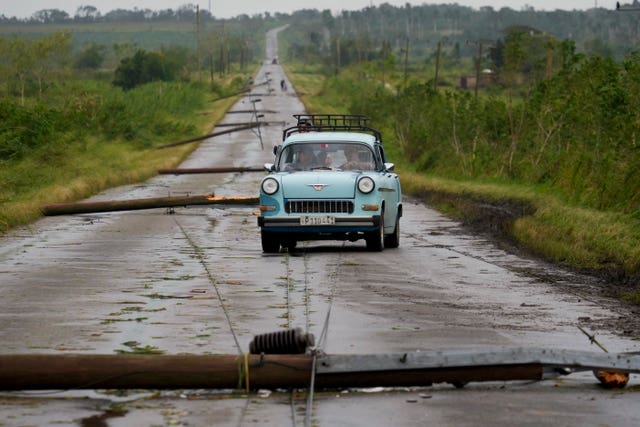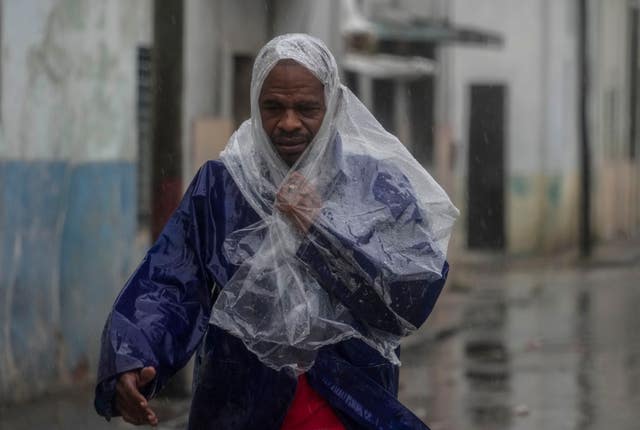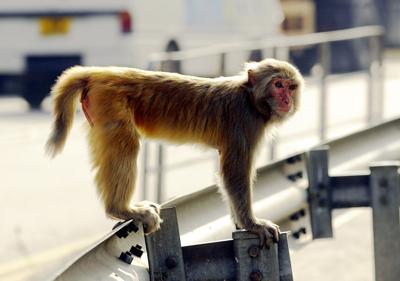Cuba was left reeling on Thursday after a fierce Category 3 hurricane ripped across the island, knocking out the country’s power grid, downing trees and damaging infrastructure.
No deaths were immediately reported.
Hurricane Rafael crossed a western portion of Cuba on Wednesday about 45 miles west of Havana, where Jose Ignacio Dimas returned home from his night shift as a security guard to find his apartment building in the historic centre of the city had collapsed.
“The entire front wall of the building fell,” he said in a tight voice as he scanned the damage early Thursday. Like many buildings in the capital, it was aging and lacked maintenance.
Some 50,000 people took shelter in Havana, with thousands more doing the same in regions south and just west of the capital since they lived in flood zones or in flimsy homes.
The main road from Havana to the southern coastal city of Batabano was strewn with dozens of utility poles and wires.
Lazaro Guerra, electricity director for the ministry of energy and mines, said power had been partially restored in the island’s western region and that generation units were powering back up.
But he warned that restoring power would be slow-going as crews took safety precautions.
As Rafael ploughed across Cuba on Wednesday it slowed to a Category 2 hurricane as it chugged into the Gulf of Mexico before heading toward Mexico, according to the National Hurricane Centre in Miami.
 People drive along a road littered with fallen power lines (Ramon Espinosa/AP)
People drive along a road littered with fallen power lines (Ramon Espinosa/AP)Late Thursday morning, the hurricane was about 200 miles west-northwest of Havana. It had maximum sustained winds of 100 mph and was moving west-northwest at nine mph.
Earlier in the week, Rafael brushed past Jamaica and battered the Cayman Islands, downing trees and power lines and unleashing heavy flooding in some areas.
Authorities in Jamaica are searching for a couple last seen inside a car that was swept away by floodwaters, police told Radio Jamaica News.
Thousands of people in Jamaica and Little Cayman remained without power as crews worked to restore electricity after the storm.
Rafael was expected to keep weakening as it spins over open waters and heads toward northern Mexico, although the hurricane centre said there was “above average uncertainty” in the storm’s future track.
 A man walks through the wind and rain (Ramon Espinosa/AP)
A man walks through the wind and rain (Ramon Espinosa/AP)Meanwhile, many Cubans were left picking up the pieces from Wednesday night, after a rocky few weeks in the Caribbean nation.
In October, the island was hit by a one-two punch.
First, it was hit by island-wide blackouts stretching on for days, a product of the island’s energy crisis. Shortly after, it was slapped by a powerful hurricane that struck the eastern part of the island and killed at least six people.
The disasters have stoked discontent already simmering in Cuba amid an ongoing economic crisis, which has pushed many to migrate.
Classes and public transport were suspended on parts of the island and authorities cancelled flights in and out of Havana and Varadero. Thousands of people in the west of the island had been evacuated from their homes as a preventative measure.
Rafael is the 17th named storm of the season.
The National Oceanic and Atmospheric Administration predicted the 2024 hurricane season was likely to be well above average, with between 17 and 25 named storms.
The forecast was for as many as 13 hurricanes and four major hurricanes.
Cuba's electrical grid collapses as Hurricane
Rafael lashes island
Reuters
Published on Nov. 7, 2024
The hurricane moved 250 km north and west of Havana Thursday morning
By Dave Sherwood
HAVANA (Reuters) - Cuban authorities struggled to return power to the island on Thursday morning after Hurricane Rafael knocked out the country's electrical grid, leaving 10 million people in the dark.
The grid collapsed on Wednesday afternoon as Rafael tore across Cuba with top winds of 115 mph (185 kph), damaging homes, uprooting trees and toppling telephone poles.
The hurricane had moved 155 miles (250 km) north and west of Havana by Thursday morning, spinning off into the Gulf of Mexico where it no longer posed an immediate threat to land, the Miami-based U.S. National Hurricane Center said.

Rafael's projected track on Nov. 7, 2024. (The Weather Network)
RELATED: High pressure looks to spare the U.S. Gulf states from Hurricane Rafael impacts
Rafael was the latest blow to the communist-run country's already precarious electrical grid, which just two weeks ago collapsed multiple times, leaving many in the country without power for days.
The Energy and Mines Ministry said it had already begun work to reconnect the national grid late on Wednesday but warned that the process would be slower in western parts of the island, which were hardest hit by the storm.
Content continues below

People walk on the street as the energy grid suffers a complete blackout while Hurricane Rafael makes landfall in Artemisa province as a category three hurricane, in Havana, Cuba
November 6, 2024. (REUTERS/Norlys Perez)
Emergency workers had returned power to some circuits, state-run media said, though Havana remained largely without power at daybreak on Thursday.
Rafael, the second hurricane to hit the island in less than a month after Oscar ravaged eastern Cuba in October, added to existing problems with power.
The country's decrepit oil-fired generation plants have struggled to keep the lights on for decades, but this year the system collapsed into crisis as oil imports dropped off from allied countries - Venezuela, Russia and Mexico. Rolling blackouts lasting hours have become the norm across much of Cuba
Heavy rain was still falling in the capital, Havana, early on Thursday, as surf pounded the waterfront Malecon boulevard and many low-lying areas and roads remained flooded. Downed tree limbs, trash and debris blocked many roadways, complicating travel and recovery efforts.
Havana's airport was scheduled to remain closed through at least Thursday at mid-day, officials said.
The storm tore across Artemisa province, which is an important farming region in a country already suffering from severe food shortages. Heavy winds and rain prompted authorities to protectively harvest ripening fruits and vegetables rather than take a total loss
.
A woman peers from a door as the energy grid suffers a complete blackout while Hurricane Rafael makes landfall in Artemisa province as a category three hurricane, in Havana, Cuba November 6, 2024. (REUTERS/Norlys Perez)
State-run media showed images of downed power lines, metal roofs strewn across city streets and shattered windows. Flooding was widespread.
Rafael grazed the Cayman Islands as a Category 1 cyclone on the five-step Saffir-Simpson hurricane scale before increasing strength in less than 24 hours to the much more powerful Category 3 that made landfall on Cuba's southwestern shore.
















